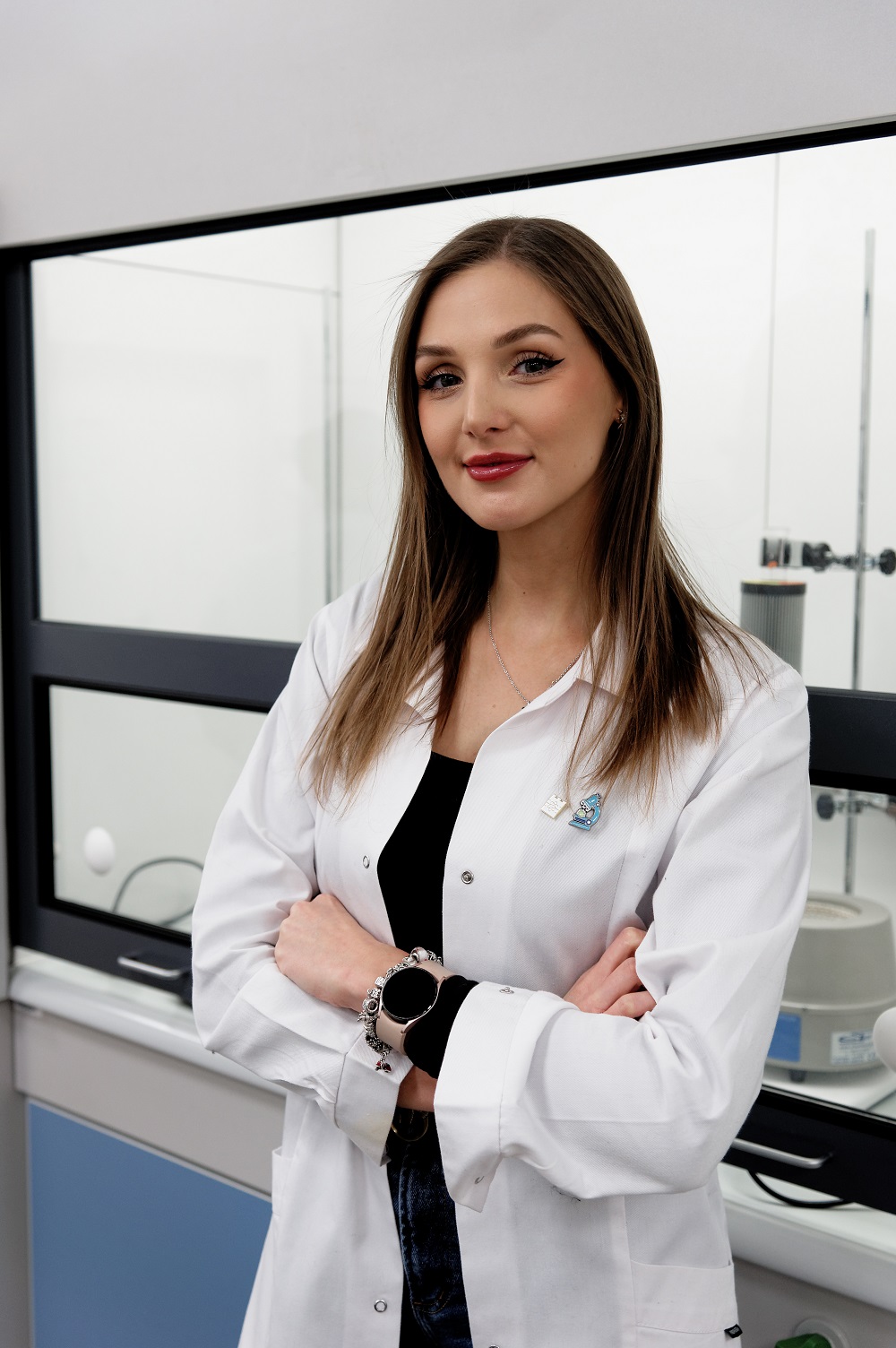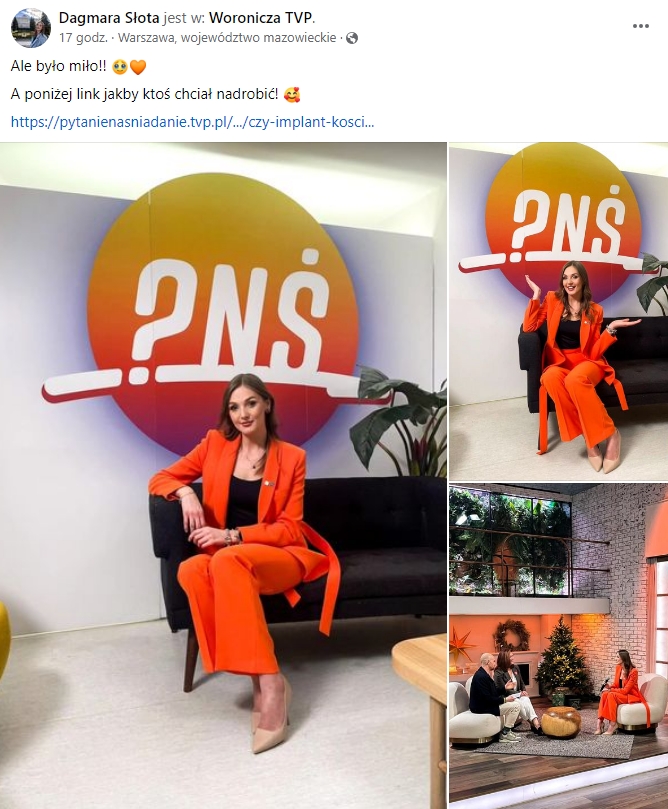Mgr inż. Dagmara Słota, a graduate of the Cracow University of Technology and a participant of the CUT Doctoral School, has already made a name for herself many times as a courageous and ambitious scientist. At the beginning of 2023, she became the winner of the "Student-Inventor" competition, and in November last year, we learned that she would receive support in the amount of PLN 1,706,450 for the project entitled "Bioactive, composite granulate with potential for 3D bioprinting". The aim of the project is to develop a material from which it will be possible to print bone implants tailored to the individual needs of a given patient. The PhD student from CUT has formed her interdisciplinary research team, which includes PhD students and postdocs from several universities. Last Sunday, Dagmara Słota spoke more extensively about her research on the TVP2 morning program "Pytanie na śniadanie".

The project "Bioactive composite granulate with potential for 3D bioprinting" involves the development of innovative materials for use in implantology. As explained by Dagmara Słota, the use of 3D printing technology to print bone defects is a real opportunity to save the health and lives of patients after accidents or those struggling with diseases leading to skull deformation. Currently, bone defects and reconstructions are mainly treated by autogenous or allogeneic transplantation. In the first case, a fragment of the patient's own bone is taken from an area of the body of low aesthetic significance. The shape of this fragment is then adapted to the defect and placed in the area of deficiency. Allogeneic transplantation, on the other hand, involves taking bone material from a stranger, usually deceased, and the donor and recipient must be antigenically matched. As pointed out by Dagmara Słota in Karolina Duszczyk's material published at naukawpolsce.pl, immunosuppressive drugs must be taken after such a transplant. Immunological complications may also occur. In addition, waiting for a donor often requires patience and time. Although commercial implants made of metals are already available, in this case, one of the shortcomings may be the risk of corrosion.
Medicine is waiting for new solutions. That is why a young team of researchers led by Dagmara Słota is getting down to work. The researchers are focusing on technology that makes it possible to print personalised implants tailored to the patient's individual needs. However, this requires a suitable material that can be safely implanted into the body. The researcher from the Cracow University of Technology admits that in medical practice, there are already known attempts to implant personalised 3D-printed implants, but the main difference between the materials currently being printed and the assumed outcome of the LIDER project's work will be the composition of the material.
– The project's main objective is to develop the composition and manufacturing technology of an innovative material for 3D printing of cranial bone implants, including parietal, frontal and temporal bones. The material, produced in the form of pellets, will be characterised by a number of features, new or significantly improved in relation to commercially available and commercially offered medical-grade materials – says Dagmara Słota. – The implant will be based on polymers that will be suitably modified to increase bioactivity, i.e. the process of stimulating bone-forming cells to proliferate. In addition, the material will be biomimetic, i.e. the composition will strongly reflect the natural bone tissue. It will also be stable – it will not degrade over time, and the patient will not be exposed to another surgery related to the need to replace the implant. Furthermore, our material will be porous. Capillaries, arterioles, and bone cells will be able to grow into the pore system. All this will guarantee better implant attachment and minimise the risk of dislocation and displacement – explains the researcher from the Cracow University of Technology.
The team managed by Dagmara Słota – a graduate of biotechnology at the University's Faculty of Chemical Engineering and Technology, a doctoral student pursuing a doctorate in the discipline of materials engineering – consists of young scientists from the Cracow University of Technology, the University of Łódź and the Gdańsk University of Technology: mgr inż. Karina Niziołek, a nanotechnologist by education, currently a doctoral student at the CUT Doctoral School in the discipline of materials engineering, mgr inż. Julia Sadlik, a materials engineer by education, currently a doctoral student of CUT DS in the discipline of materials engineering, mgr inż. Mateusz Dyląg, a graduate of automation and robotics at the AGH University of Krakow, 3D printing specialist, doctoral student of CUT DS in the discipline of materials engineering, mgr Mateusz Urbaniak, graduate of microbiology at the University of Lodz, currently a doctoral student at the BioMedChem Doctoral School of the University of Lodz and Institutes of the Polish Academy of Sciences in Lodz in the discipline of biological sciences, dr inż. Marcin Wekwejt from the Gdańsk University of Technology, a graduate of doctoral studies at the Gdańsk University of Technology in the field of materials engineering, and previously studies in biomedical engineering. For the first time, Dagmara Słota is the leader of a group of scientists and a person managing a large scientific project: – I do not hide that this is a big challenge, also in terms of the implementation of research tasks. However, the members of the R&D team represent different disciplines; we complement each other with our experience. I firmly believe that we will succeed.
at the CUT Doctoral School in the discipline of materials engineering, mgr inż. Julia Sadlik, a materials engineer by education, currently a doctoral student of CUT DS in the discipline of materials engineering, mgr inż. Mateusz Dyląg, a graduate of automation and robotics at the AGH University of Krakow, 3D printing specialist, doctoral student of CUT DS in the discipline of materials engineering, mgr Mateusz Urbaniak, graduate of microbiology at the University of Lodz, currently a doctoral student at the BioMedChem Doctoral School of the University of Lodz and Institutes of the Polish Academy of Sciences in Lodz in the discipline of biological sciences, dr inż. Marcin Wekwejt from the Gdańsk University of Technology, a graduate of doctoral studies at the Gdańsk University of Technology in the field of materials engineering, and previously studies in biomedical engineering. For the first time, Dagmara Słota is the leader of a group of scientists and a person managing a large scientific project: – I do not hide that this is a big challenge, also in terms of the implementation of research tasks. However, the members of the R&D team represent different disciplines; we complement each other with our experience. I firmly believe that we will succeed.
The project leader can count on the support of her mentor and the supervisor, prof. dr hab. inż. Agnieszka Sobczak-Kupiec from the Department of Materials Engineering at the Faculty of Materials Engineering and Physics. Dagmara Słota's doctoral thesis, "Composite coating with controlled bioactivity for medical applications", was implemented as part of the TEAM-NET project, headed by Professor Agnieszka Sobczak-Kupiec.
January 28, mgr inż. Dagmara Słota presented her extraordinary scientific activities to a wider audience. The doctoral student from the Cracow University of Technology was a guest on the morning programme "Pytanie na śniadanie". We encourage you to watch the interview.



